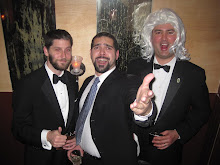NPR ran a segment yesterday that attempted to get at the heart of American tipping culture. Planet Money's Caitlin Kenney examines the more visceral questions that are typically underlying the discussions about gratuity.
Bartenders know all-too-well the various forms that question can take, such as, "why, for the love of all that's holy, do some customers give less than 15% tip on perfectly good service?" At first, Kenney seems interested in providing an answer here:
"Studies show that the size of the tip doesn't have much to do with the quality of service. The weather, how sunny it is, what kind of mood people are in, these factors matter just as much as how satisfied the customers are with the service they receive."
Jessica Gibson, a waiter at an Irish pub in Tulsa, Oklahoma, believes that the harder she works, the greater her tips are. Yet she also admits that when she's a customer, she always leaves a 20% tip, even if the service is terrible.
Like most people, Jessica tips pretty much the same amount no matter what."
This revelation is not new. Anyone in the service industry can tell you that seemingly frivolous circumstances can have a disappointing result on one's tip jar. That's why many seasoned FOH staff in restaurants across the country likely bank his or her income on a synthesis of great service and customer volume.
But Kenney isn't actually interested in how clientele tip. She really wants to know:
"if we don't tip to get better service, why do we it?
"Michael Lynn, a professor at Cornell's School of Hotel Administration and [I love this] a former waiter at Pizza Hut, says there is another explanation: We tip because we feel guilty about having people wait on us. It's a way of saying: 'Here, have on drink on me when you're done working.'
This is the social pressure theory of tipping, an idea first put forward by anthropologist George Foster.
This theory explains why we tip some people but not others. We tend to tip in places where we're having a lot more fun than the people who are serving us: bars, restaurants, cruise ships. But we usually don't tip in grocery stores or dentist's offices."
That last part made me think back to the scene in Resevior Dogs where Steve Buscemi's character, Mr. Pink, refuses to leave a couple bucks for the waitress and Harvey Keitel's character, Mr. White, attempts to convey a sobering perspective to convince Mr. Pink otherwise (NSFW).
Incidentally, who the hell drinks six cups of coffee? Anyway,the implications of Foster's hypothesis seem to suggest that guilt, empathy, or even pure altruism, was a significant element to the formation of the tipping culture Americans are familiar with today. That would seem to contradict the idea that the market forces influenced the American tipping system (i.e. good service begets a good tip).


No comments:
Post a Comment